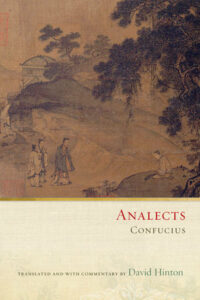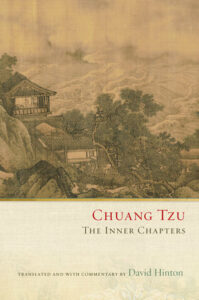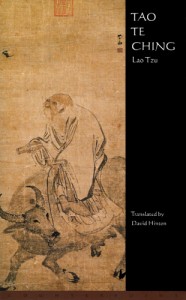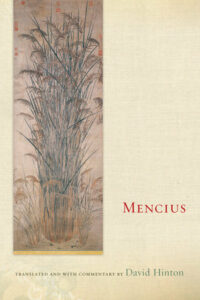David Hinton
David Hinton has been awarded a Guggenheim Fellowship, numerous fellowships from the National Endowment for the Arts and the National Endowment for the Humanities, and both of the major awards given for poetry translation in the United States: the Landon Translation Award, and the PEN Translation Award. His recent book of essays, Hunger Mountain: A Field Guide to Mind and Landscape, was on the Best–Books–of–the–Year list at The Guardian in England. Hinton lives in Vermont.
Subscribe to our newsletter for news & events from Counterpoint Press.
Books
Analects
While Confucius failed in his lifetime to rescue a crumbling civilization with his teachings, he was to become the most influential sage in human history. His thought, still remarkably current and even innovative after 2500 years, survives here in The Analects — a collection of brief aphoristic sayings that has had a deeper impact on more people's lives over a longer period of time than any other book in human history.Formulated in the ruins of a society that had been founded on untenable spiritualistic concepts of governance, Confucius' philosophy postulated a humanistic social order that has survived as China's social ideal ever since. Beginning with the realization that society is a structure of human relationships, Confucius saw that in a healthy society this structure must be a selfless weave of caring relationships. Those caring relationships are a system of "ritual" that people enact in their daily lives, thus infusing the secular with scared dimensions.
Highly regarded for the poetic fluency he brings to his award–winning work, David Hinton is the first twentieth–century translator to render the four central masterworks of ancient Chinese thought: Chuang Tzu, Mencius, The Analects, and Tao te Ching (forthcoming). HIs new versions are not only inviting and immensely readable, but they also apply a much–needed consistency to key terms in these texts, lending structural links and philosophical rigor heretofore unavailable in English. Breathing new life into these originary classics, Hinton's translations will stand as the definitive series for our era.
Chuang Tzu
The Inner Chapters
Revered for millennia in the Chinese spiritual tradition of the Tao Te Ching, this poetic translation of an ancient Taoist text comes alive for the modern readerWitty, engaging and spiced with the lyricism of poetry, Chuang Tzu's Taoist insights in the Inner Chapters are timely and eternal. The only sustained section of text widely believed to be the work of Chuang Tzu himself, these chapters date to the 4th century B.C.E and are profoundly concerned with spiritual ecology.
With bold and startling prose, David Hinton's vital translation is surprisingly modern, making this ancient text from the golden age of Chinese philosophy come alive for contemporary readers. The Inner Chapters' fantastical passages offer up a wild menagerie of characters, freewheeling play with language, and surreal humor. Interwoven with Chuang Tzu's sharp instruction on the Tao are short stories that are often rough and ribald, rich with satire and paradox.
Tao Te Ching
The definitive contemporary English version of Lao Tzu's influential spiritual text, masterfully translated for modern audiences by an expert on Chinese poetry and philosophyLike all of his translations, Hinton's translation of the Tao Te Ching is mind–opening, presenting startling new dimensions in this widely–influential text. He shows how Lao Tzu's spirituality is structured around the generative life–force, for example, and that this system of thought weaves the human into natural process at the deepest levels of being, thereby revealing the Tao Te Ching as an originary text in deep feminist and ecological thought.
Lao Tzu's Tao Te Ching is not only the single most important text ever composed in China, it is probably the most influential spiritual text in human history. In the past, virtually all translations of this text have been produced either by sinologists having little poetic facility in English, or writers having no ability to read the original Chinese. Hinton's fluency in ancient Chinese and his acclaimed poetic ability provide him the essential qualifications. Together, they allow a breathtaking new translation that reveals how remarkably current and even innovative this text is after 2500 years.
Mencius
This ancient text records the teachings of Mencius (4th c. B.C.E.), the second originary sage in the Confucian tradition which has shaped Chinese civilization for over two thousand years.In a culture that makes no distinction between those realms we call the heart and the mind, Mencius was the great thinker of the heart, and it was he who added the profound inner dimensions to the Confucian vision. Given his emphasis on the heart, it isn't surprising that his philosophical method is very literary in nature: story and anecdote full of human drama and poetic turns of thought. Indeed, the text is considered a paragon of literary eloquence and style.
Mencius' strikingly contemporary empiricism represented a complete secularization of the spiritualist concepts of governance that had dominated China for over a millenia. He invested the humanist Confucian vision with its inner dimensions by recognizing that the individual is an integral part of a self–generating and harmonious cosmos. He saw all the spiritual depths of that cosmology inside us, and this led to a mystical faith in the inherent nobility of human beings. In his chaotic and war–ravaged times, he was therefore passionate in his defense of the people. Indeed, he advocated a virtual democracy in which a government's legitimacy depended upon the assent of the people. Such is the enduring magic of the Mencian heart— full of compassionate and practical concern for the human condition, and yet so empty that it contains the ten thousand transformations of the entire cosmos.

Catapult | Counterpoint | Soft Skull
1140 Broadway #706
New York, NY 10001
646.926.0805 | info@counterpointpress.com








